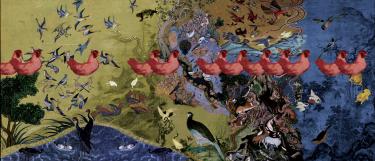
Global Art History
Global Art History at the HCTS builds on a theory of transculturation to enable art history to overcome different shades of parochialism – Eurocentrism, methodological nationalism, or insulated area studies. We investigate art historical subjects from a perspective not exclusively aligned along a Euro-American axis, though constantly shaped through interaction with globally travelling concepts and practices. Our courses address a wide range of themes that problematize object histories, pictorial practices, art and activism, or the role of art institutions, all of which question established assumptions about medium, genre, quality and connoisseurship. By not subscribing to a purely presentist understanding of the global, our teaching and research systematically attend to pre- and early modern dimensions of transculturation in the arts. Our pedagogical approach envisages a mutually fructifying relationship between the museum and university, implemented through collaborative exhibition projects as well as regular interactions with artists and curators built into classroom teaching.
Research
Transculturation and practices of visual representation, the disciplinary formation of art history in a global context, global histories of modernist art, histories of migrating art historical concepts, recuperating the life stories of women art historians. Funded projects include Worlding Public Cultures. The Arts and Social Innovation (BMBF); Wege – Methoden – Kritiken: Kunsthistorikerinnen 1880-1970 (DFG). Themes of doctoral research include Curating Islamic Art in European Museums; Contemporary Japanese Art and the 3.11. Disaster; German Collectors of South Asian Art; The Program “Museum Global” of the Kulturstiftung des Bundes; Art Collectives in documenta fifteen; Provenance Research into German Collections of Oceanic Objects.
Studies
The Department offers courses on a wide range of themes: Themes and Methods of Global Art History, Curating as Transcultural Praxis, Art Making and Ecological Imaginaries, The Politics of Museums, Monuments and Contested Heritage, Feminist Approaches to Art History. These courses are cross-posted in the curricula of the Institutes of European as well as East Asian Art History, and the South Asia Institute. Classroom teaching is accompanied by regular excursions to museums and exhibitions. In addition, the Department participates in theory-based reading classes for doctoral students.


